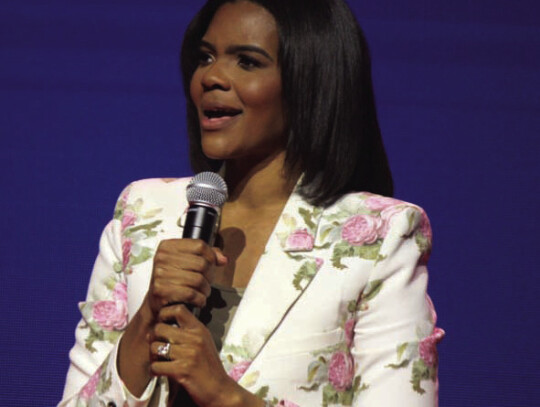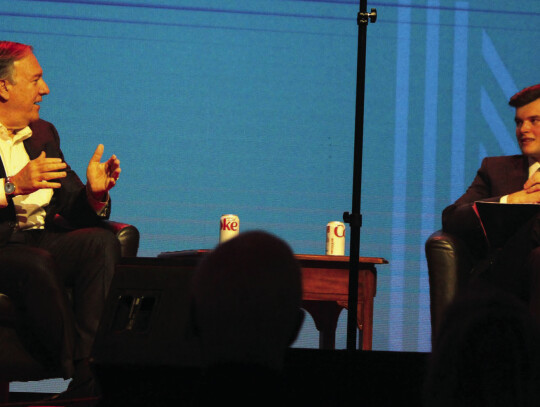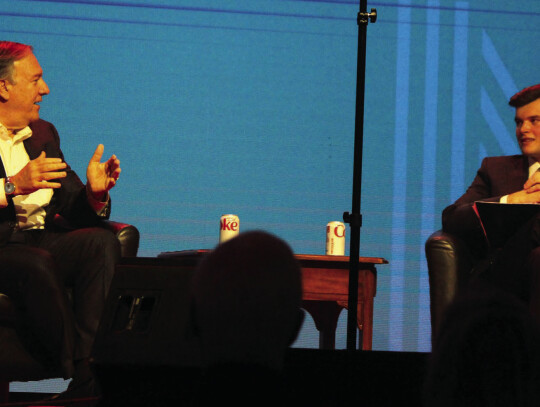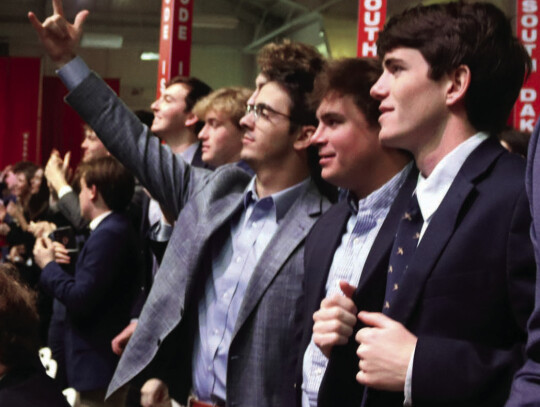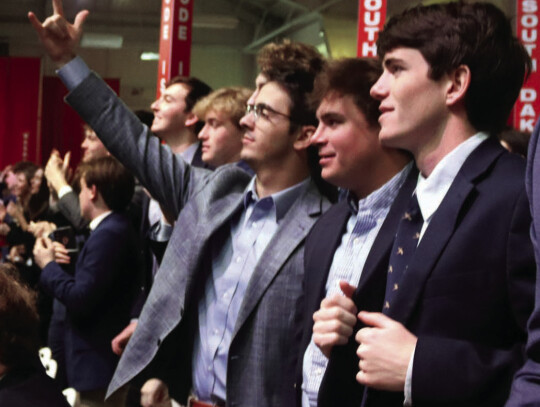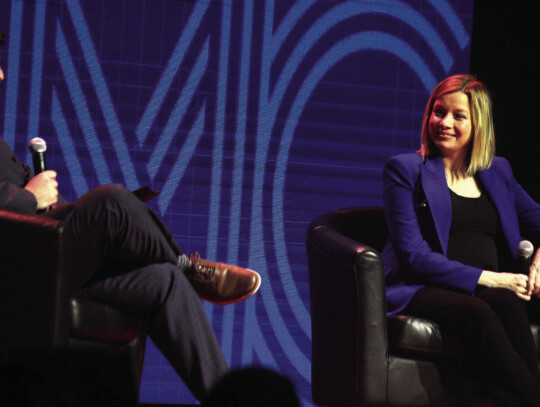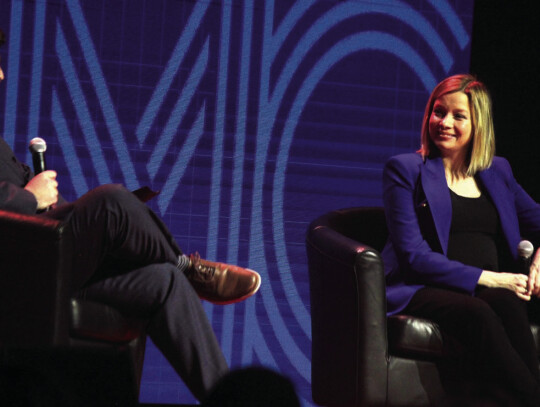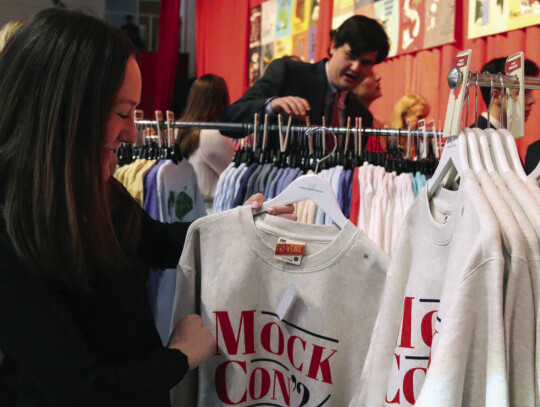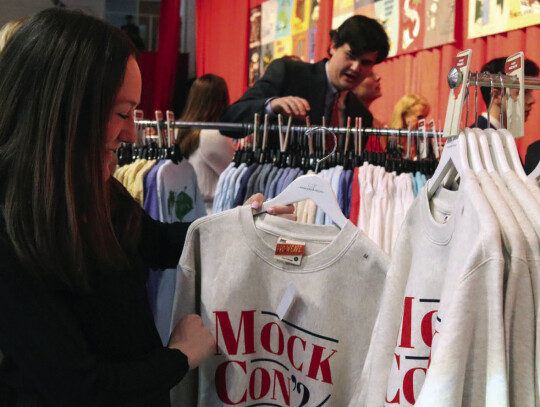Washington and Lee University’s mock convention commenced with a parade down Main Street featuring a float from every single delegation. The energy was palpable as students dressed as New York hot dogs, Wisconsin cheese heads and Maryland crabs – the latter of which danced and cheered. Floats delivered the students to the convention site, where an impressive lineup of speakers took the stage.
Leading the charge in the opening session was Kristen Soltis Anderson, a Republican pollster, television personality and political commentator. Anderson’s expertise in polling trends provided attendees with valuable insights into the future of American politics, setting the tone for the convention’s discussions on generational shifts and emerging political dynamics.
“I remember very fondly being here eight years ago when the convention was debating whether or not it would be Donald Trump, Ted Cruz or someone else,” Anderson said. “I got to come and speak about the role that Millennials would play in that process. Back then, we were the young people in the Republican party. Now, we’re turning 40.”
Anderson, who is 40, said Millennials and Gen Z feel similarly disillusioned with the current state of politics. She said that despite Gen Z’s progressive reputation, their votes are still “up for grabs.”
“They are still very much formulating what is their viewpoint and what they want for the future,” she said.
Anderson said that if the presidential candidates are Biden and Trump again, many Gen Z members feel it “wouldn’t make a big difference” who won.
“I’m not sure that I think there’s a difference between these two older candidates who don’t feel like they represent me, my generation or my values.”
Anderson said Republican voters’ concerns about Trump have subsided over the past year. She said that’s why the former party candidate Ron DeSantis saw such a decline in support.
She said in the beginning of 2023, many Republican voters supported DeSantis merely because they feared Trump could not beat Biden. Anderson said DeSantis was not aggressive enough during his campaign to garner more authentic support.
“In politics, you can always raise more money, but you can’t raise more time,” she said. Anderson said candidates should pay more attention to the time preceding election day.
Candace Owens, a Black conservative political commentator, next delivered a critique of mainstream media narratives and advocated for a return to conservative values.
Owens began by highlighting what she sees as a pervasive bias in the media, particularly towards Republicans. She argued that the mainstream media often fails to tell the truth and presents confusing narratives, leading to a warped perception of reality, especially among young people.
Reflecting on her own upbringing, Owens lamented the loss of traditional values.
“When I was growing up, everyone knew that men and women were different,” said Owens. She recounted her public scrutiny after stating, “Black people don’t have to be Democrats.” She highlighted the attacks she faced from the media for challenging conventional political allegiances within the Black community.
Owens then shared insights from her conversations with Dennis Prager, a conservative radio talk show host, who suggested that the left ultimately seeks chaos.
“And then with time and experience,” Owens said, “I realized it’s actually the opposite. It’s actually order, they understand exactly what they’re doing and the plan is Machiavellian.”
Owens pointed to feminism as an example of this agenda, criticizing its portrayal of men as oppressors and patriarchy as a ubiquitous force holding women back. Expanding her critique, Owens took aim at what she described as the “insanity” of the climate change lobby and the “LGBT agenda.” She framed these issues as “Marxist” principles designed to undermine the family unit, which she believes the government seeks to diminish.
In Owens’ view, feminism has not liberated women but rather been “advantageous for the government, who found a way to tax one household three ways.”
Mike Pompeo, former congressman who served in the Trump administration first as secretary of state and then as director of the CIA, took the stage next. As he sat down, he mentioned that both of the university’s namesakes attended his alma mater, West Point.
“It was awesome being the secretary of state but man, it’s great when you’re the CIA director. There’s no press,” said Pompeo.
Reflecting on a pivotal moment during his career, Pompeo shared insights into the decision-making process behind the strike on Qasem Soleimani, an Iranian military officer considered at the time to be the “number two official in Iran.” Pompeo emphasized the importance of holding Iran accountable for its actions, stating, “We had said if you do X we will do Y, and they went and did X.”
Despite facing significant opposition from “institutional Washington,” Pompeo said he defended the strike as a necessary measure to reduce risk for Americans on the ground in the Middle East.
He underscored the success of the strike as sending a clear message to Iran and asserted, “If we do it right, Iranians will fear war with America.”
Turning his attention to present issues in the Middle East, Pompeo expressed concerns about the current trajectory of American policy in the region.
He criticized the Biden administration for creating “enormous risk” and warned against the consequences of getting foreign policy wrong. Drawing parallels between American and Israeli positions, Pompeo said that the United States should not hesitate to defend its interests and allies in the face of external threats.
Pompeo emphasized the importance of foreign policy in shaping domestic election outcomes.
“What happens in Tel Aviv matters in Des Moines, what happens in Kiev matters in Wichita, Kansas.”
Pompeo also addressed the impact of regional conflicts on global trade, warning of potential disruptions caused by Houthi activity in the Red Sea.
“The Biden administration so far has been reluctant for fear of escalating and the result of that is escalation,” he said.
Pompeo further criticized the Biden administration’s handling of the southern border and called it an act of incompetence. He described the situation as “the most precipitous, dangerous matter that faces the nation today.”
He said he believes that border security is not just a regional concern but an American issue, with far-reaching implications for national security and public safety.
Pompeo highlighted his efforts to change the “incentive system” at the southern border, advocating for policies that prioritize lawful immigration and deter illegal crossings.
“It was better for Mexico, it was better for Honduras, El Salvador, it was certainly better for us,” Pompeo said.
The room erupted with laughter each time Pompeo impersonated his former boss’s voice.
Pompeo maintained that Trump was a great boss. “He allowed me to do my job,” he said.
Mike Allen, a political journalist who graduated from W&L in 1986, followed Pompeo and applauded students for their dedicated work. He reflected on his own mock convention in 1984, for which he was the southern regional chair. President Biden, then a senator, was a keynote speaker at this convention.
“In the bio they said this junior senator is considered to have a big future in the Democratic Party. The Washington and Lee Mock Convention always gets it right. Thirty-seven years later, the junior senator was inaugurated as president.”
Jonathan Haidt, a social psychologist and professor at New York University’s Stern School of Business, spoke next. Haidt is known for his research on morality and political polarization. He said brains operate in “discover mode” or “defense mode,” either of which opens up new opportunities or protects one in a comfortable zone. He said too many college students operate in defense mode, for fear of backlash and because of anxiety. He pointed to safe spaces and trigger warnings and declining mental health as evidence. He said ideas like this prevent students from learning or expanding their viewpoint.
Haidt was critical of what he said is higher education’s lack of viewpoint diversity. He said high rates of anxiety and depression are related to increased cellphone usage. He urged students to turn off notifications on their phones. He also said they should “be less moralistic, more curious. … Ancient wisdom doesn’t tell us to judge quicker and with less confidence.”
Rounding out the lineup was Chris Miller, who served as Trump’s last secretary of defense following the 2020 election. Miller, whose career in public service provided attendees with a firsthand perspective on the challenges facing America’s national security, was critical of the American defense budget.
“I was in Estonia the other day; their budget’s $1.5 billion. Ours is a trillion. I was like, we waste more money in an afternoon than you spend in a whole year.”
.jpg)
